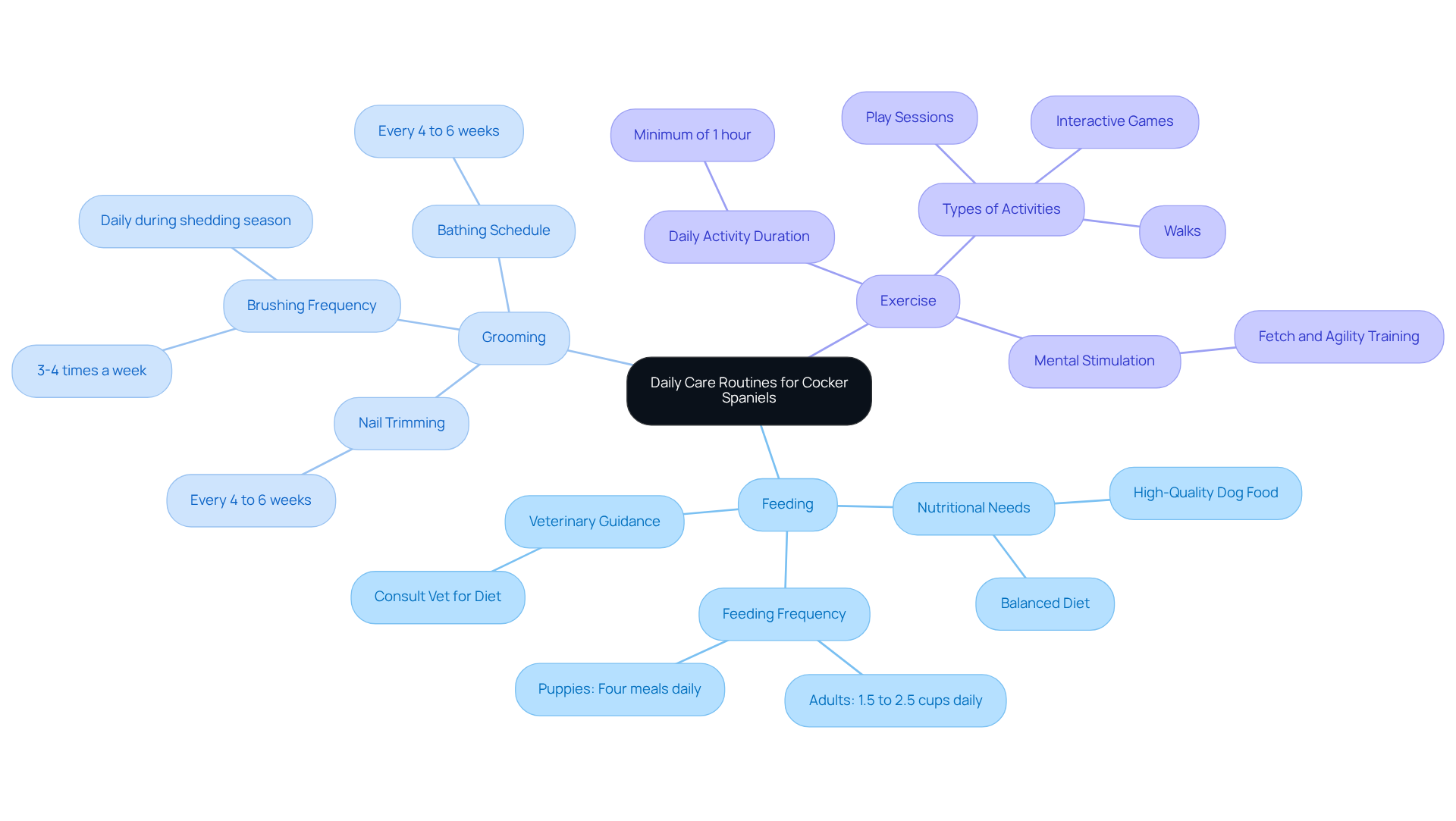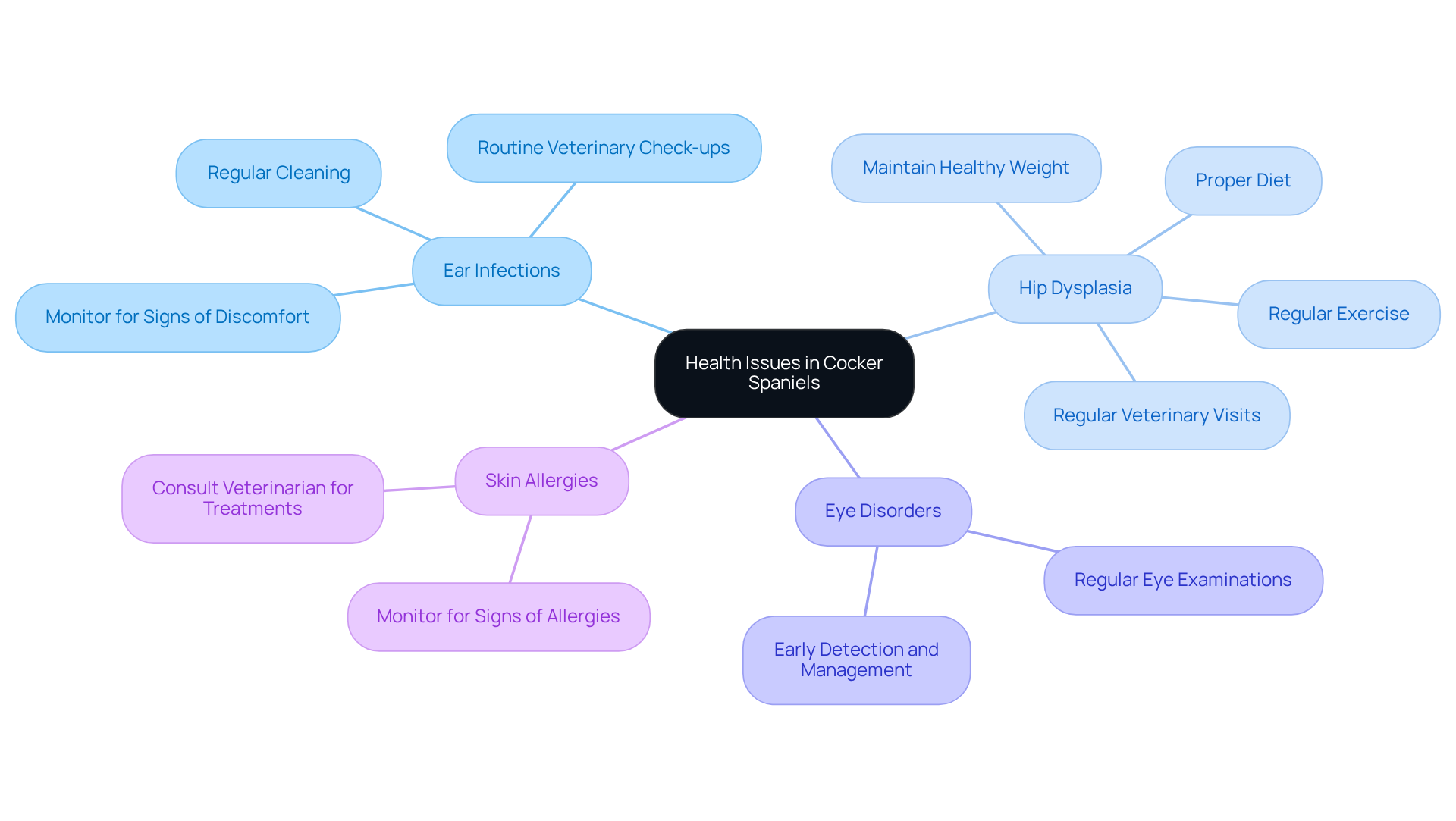Cocker Spaniel Black Care: Essential Steps for Happy Pets
Overview
Caring for a Cocker Spaniel, especially the black variety, means embracing their affectionate nature and understanding their high energy levels and grooming needs. These beloved companions thrive in a nurturing environment where daily routines for feeding, grooming, exercise, and socialization are established. By proactively managing common health issues, you not only ensure their happiness but also foster a strong bond with your furry family member.
Let’s create a joyful life together, filled with love and care.
Introduction
Cocker Spaniels, especially the black variety, are truly cherished for their affectionate nature and vibrant personalities, making them beloved companions in many households. As a pet owner, understanding their specific needs—from grooming and exercise to socialization and health care—is essential for ensuring a happy and fulfilling life for these energetic dogs.
However, it’s common for many pet owners to grapple with the unique challenges of meeting these requirements. What are the key steps to effectively care for your Cocker Spaniel, and how can you navigate the complexities of their health and behavior to foster a joyful relationship?
Let’s explore these important aspects together.
Understand Cocker Spaniel Characteristics and Needs
Cocker Spaniels, including the cocker spaniel black variety, are truly celebrated for their friendly and affectionate demeanor, making them ideal companions for families and individuals alike. Understanding their unique characteristics is crucial for ensuring their well-being:
- Affectionate Nature: Your furry family members thrive on human interaction, forming strong bonds with their owners. Their gentle temperament makes them particularly good with children and other pets, fostering a loving family environment.
- Energy Levels: This breed is known for its high energy and requires at least 30-60 minutes of exercise daily. Activities such as walking, running, and playing fetch are essential to keep them healthy and happy. Regular exercise not only meets their physical needs but also helps prevent behavioral issues stemming from boredom.
- Social Needs: These dogs are inherently social creatures that enjoy the presence of both humans and other canines. Early socialization is vital to developing a well-adjusted adult dog, as it helps them become comfortable in various environments and with different people.
- Grooming Requirements: Their long, silky coats necessitate regular grooming to prevent matting and maintain hygiene, particularly around the ears and paws. Weekly brushing is recommended, along with routine ear cleaning to prevent infections, a common issue due to their floppy ears. Furthermore, Spaniels are susceptible to separation anxiety, making it essential to offer them companionship and mental engagement.
By identifying these characteristics and demands, you can establish a supportive atmosphere that addresses your cocker spaniel black’s needs, ensuring a satisfying and joyful life together. Remember, nurturing your Cocker Spaniel is not just about fulfilling their basic requirements; it’s about creating a loving bond that enriches both your lives.

Establish Daily Care Routines: Feeding, Grooming, and Exercise
To ensure your Cocker Spaniel remains healthy and happy, it’s essential to establish a daily care routine that lovingly includes:
-
Feeding: Providing high-quality dog food that meets their nutritional needs is crucial. Adult Spaniels typically require between 1.5 to 2.5 cups of dry food daily, divided into two meals. Puppies often need more frequent feedings, around four times a day. Understanding the nutritional requirements of your furry family member is vital, so seeking guidance from your veterinarian for specific dietary suggestions can help customize the feeding schedule to your dog’s unique preferences.
-
Grooming: Regular grooming is key for this breed due to their long, silky coats. It’s recommended to brush their fur at least 3-4 times a week to prevent matting and tangles, with daily brushing especially important during shedding seasons. Generally, Spaniel breeds benefit from a bath every 4 to 6 weeks to maintain their fur and cleanliness, particularly around the ears and paws, which can accumulate dirt and moisture. Additionally, nail trimming should occur every 4 to 6 weeks to ensure comfort and prevent overgrowth.
-
Exercise: This breed thrives on at least one hour of physical activity each day. You can achieve this through two walks, engaging play sessions, or interactive games. Activities like fetch or agility training not only provide necessary physical exercise but also stimulate their minds, contributing to their overall well-being. Considering that this breed has a lifespan of over 11 years, maintaining a healthy lifestyle is crucial for their longevity.
By following this nurturing routine, you will help your Spaniel flourish both physically and emotionally, ensuring they remain a happy and cherished member of your family.

Identify and Manage Common Health Issues in Cocker Spaniels
Cocker Spaniels are beloved companions, but they can be prone to several health issues that caring owners should proactively manage:
-
Ear Infections: The long ears of Cocker Spaniels create a warm, moist environment that can lead to ear infections. Regular cleaning of the ears and routine veterinary check-ups are crucial in preventing this common issue. Stay vigilant for signs of discomfort, such as head shaking or scratching, as these can indicate an underlying problem.
-
Hip Dysplasia: This genetic condition affects the hip joint, potentially leading to arthritis and mobility issues. Maintaining a healthy weight through a proper diet and exercise, along with regular veterinary visits, can significantly reduce the risk of developing hip dysplasia. Your furry family member deserves to move freely and comfortably.
-
Eye Disorders: Spaniels are susceptible to various eye conditions, including cataracts and progressive retinal atrophy. Regular eye examinations are essential for early detection and management of these disorders, ensuring that any issues are addressed promptly. Protecting their sight is crucial for their quality of life.
-
Skin Allergies: Allergies can manifest as skin irritations, leading to itching and discomfort. Monitor your pet for signs of allergies, such as redness or excessive scratching, and consult with a veterinarian for appropriate treatments. A little attention can go a long way in ensuring their comfort.
By staying informed about these health concerns and collaborating closely with a veterinarian, you can help ensure your cocker spaniel leads a healthy, happy life. Understanding the breed’s particular requirements and possible health challenges is essential for effective management and care. As Sandra, the owner of Ide, noted, “I’ve never had such a good experience with an insurance company. Such a good experience during such a difficult time,” underscoring the importance of having reliable support during challenging moments. With a lifespan of 12-15 years, addressing these health concerns is vital for securing a long and satisfying life for your dog. The Cocker’s friendly and cheerful personality makes it an excellent pet, but understanding its specific exercise needs and health concerns is essential for providing the best care.

Promote Socialization and Training for a Well-Behaved Companion
To foster good behavior and social skills in your furry family member, consider these essential steps:
- Socialization: Start socializing your Cocker Spaniel early by introducing them to a variety of environments, people, and other animals. The critical socialization period for puppies is from 3 to 12 weeks of age, making this the perfect time to enroll in puppy classes and arrange playdates. These structured opportunities for social interaction are crucial for their development.
- Training: Use positive reinforcement techniques, such as treats and praise, to encourage desirable behaviors. Focus on teaching basic commands like sit, stay, and come from an early age. Remember, consistency and patience are vital components of effective training. In fact, 73% of dog owners utilized some form of training method in 2020, underscoring the importance of training in nurturing good behavior.
- Mental Stimulation: Keep your dog mentally engaged with puzzle toys, training games, and interactive play. This not only sharpens their cognitive skills but also helps prevent boredom, which can lead to behavioral issues.
- Regular Outings: Take your dog on adventures to parks or pet-friendly events. These experiences expose them to new sights and sounds, reinforcing their social skills and confidence. Facilities like Adventure Den provide environments that support these practices, ensuring your pet has ample opportunities for socialization and training.
By prioritizing socialization and training, you will cultivate a well-behaved and confident companion, enhancing the bond between you and your Cocker Spaniel. Remember, every step you take in nurturing their development is a step towards a happier, healthier relationship.

Conclusion
Caring for a Cocker Spaniel, especially the black variety, requires a heartfelt understanding of their unique needs and characteristics. By recognizing their affectionate nature, high energy levels, and grooming requirements, you can create a nurturing environment that promotes both physical health and emotional well-being. This breed thrives on companionship and regular interaction, making it essential to foster the bond between you and your furry family member for a fulfilling life together.
Key aspects of care involve establishing a daily routine that encompasses proper nutrition, grooming, and exercise. Providing high-quality food, maintaining a consistent grooming schedule, and ensuring ample physical activity are crucial steps to keep your Cocker Spaniel healthy and happy. Additionally, being aware of common health issues such as ear infections and hip dysplasia can aid in early detection and management, ensuring a long and vibrant life for your beloved companion.
In conclusion, the journey of caring for a Cocker Spaniel is both rewarding and enriching. By prioritizing socialization and training, you can cultivate a well-behaved and confident companion. Embracing these essential care practices not only enhances the quality of life for your dog but also strengthens the loving bond you share. For those seeking to provide the best for their Cocker Spaniel, understanding and addressing these needs is vital—ensuring that every wag of the tail reflects a life filled with joy and companionship.
Frequently Asked Questions
What are the main characteristics of Cocker Spaniels?
Cocker Spaniels are known for their friendly and affectionate demeanor, making them ideal companions for families and individuals. They thrive on human interaction and form strong bonds with their owners.
How much exercise do Cocker Spaniels need?
Cocker Spaniels require at least 30-60 minutes of exercise daily. Activities such as walking, running, and playing fetch are essential to keep them healthy and happy.
Why is socialization important for Cocker Spaniels?
Socialization is vital for Cocker Spaniels as they are inherently social creatures. Early socialization helps them become comfortable in various environments and with different people, leading to a well-adjusted adult dog.
What are the grooming requirements for Cocker Spaniels?
Cocker Spaniels have long, silky coats that require regular grooming to prevent matting and maintain hygiene. Weekly brushing and routine ear cleaning are recommended to prevent infections, especially due to their floppy ears.
Do Cocker Spaniels experience separation anxiety?
Yes, Cocker Spaniels are susceptible to separation anxiety. It is essential to provide them with companionship and mental engagement to help alleviate this issue.







